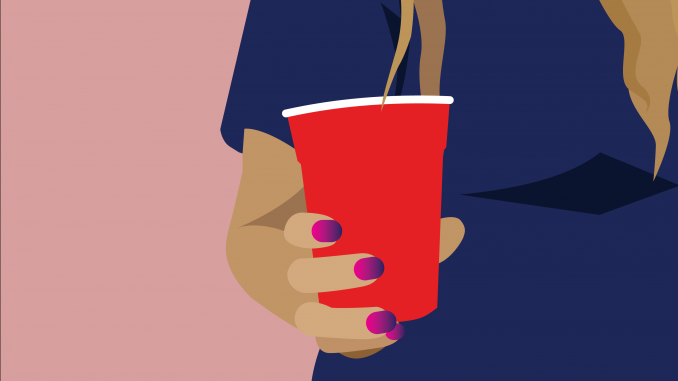
Nicole Commisso was always anxious about drinking out of open containers throughout her time in college, especially once she turned 21. After the disturbing news of a rape occurring in Patchogue, New York, her hometown, Nicole began researching ways to combat date rape.
In 2019, Commisso began My Cup Condom, or latex drink covers, to protect future victims and avoid any potential contamination of alcohol from date-rape drugs.
“Our mission is to keep your drink safe and protected from unwanted contaminants and spillage. Protecting those who want to go out and have fun without worrying about their safety is so important to us,” Commisso said
Every 73 seconds, an American experiences sexual assault, according to the Rape, Abuse & Incest National Network. On college campuses, that number includes almost one out of four women and one of six men.
Date rape, or acquaintance rape, is defined as unwanted sexual activity by a victim’s date, friend, or peer through methods such as violence or substances, according to Encyclopedia Brittanica. In short, it is understood that the victim knows the attacker.
According to Health Research Funding, date rape incidents make up for about 90 percent of college campus rapes.
In an attempt to combat these numbers, companies such as Commisso’s My Cup Condom and Undercover Colors, a drug-revealing nail polish, have sprung up in the tech industry.
A common misconception is that women are the only victims of sexual assault, according to the University of Michigan’s Sexual Assault Prevention and Awareness Center. However, this epidemic affects around 16 percent of men as well as 21 percent of transgender students, according to RAINN.
In Commisso’s effort to eradicate these drinking dangers, she emphasizes her products are made for every individual, not just women.
“Since inventing this product, I have had many positive reactions from men and I can’t tell you how many guys have told me their personal story of being roofied as well as girls,” Commisso said.
Shira Freiman, president of It’s On Us TU, said her club also recognizes the importance of including all gender identities in the conversations about sexual violence. Freiman, a senior psychology and criminology major, worked to bring the group to campus.
It’s On Us TU is a chapter of the national organization It’s On Us—a 2014 nonprofit Obama-Biden initiative to increase conversations on sexual assault prevention. The Temple chapter seeks to provide safety for people, specifically resources and education for students through workshops, seminars, and events.
“We cannot resolve the underlying issues related to sexual assault without holding the space for all people to speak out,” Freiman said.
Date rape drugs, such as Rohypnol and GBL or Gamma-Butyrolactone, are often mixed with alcohol in order to coerce an individual into nonconsensual sexual activity, Women’s Health reported. Students should be aware that these drugs can come in the form of dissolvable or ground-up pills, liquids, or — in the case of GHB — a clear, odorless and salty liquid, typically placed in strong drinks so as to be unknowingly consumed, Forbes reported.
Nearly half of all sexual assaults occur alongside alcohol consumption by the perpetrator, the victim, or both, according to the National Institute on Alcohol Abuse and Alcoholism.
Although a victim’s alcohol consumption may increase their risk of sexual assault, they are in no way responsible, assures the NIAAA. Legally and morally, the offender is always at fault.
Freiman said she is thankful that safety products have been created, however, there is more to be done.
“These products are a short term solution to a long term problem, in my opinion. However, it’s well overdue that such products are available. It’s unfortunate that the sexual assault epidemic, particularly on college campuses, has gotten to this point,” Freiman added.
Freiman said that while sexual-assault-preventative products do not solve the problem of sexual violence, they do “create the opportunity to have difficult discussions about sexual assault, and open the eyes of people who may not have realized the prevalence of the issue before.”
“Hopefully, with society becoming more aware of these dangers and more aware of being able to protect yourself, there will be less and less bad people trying to do bad things,” Commisso said. “All we can do is stack the odds in our favor as far as protecting yourself.”


Be the first to comment